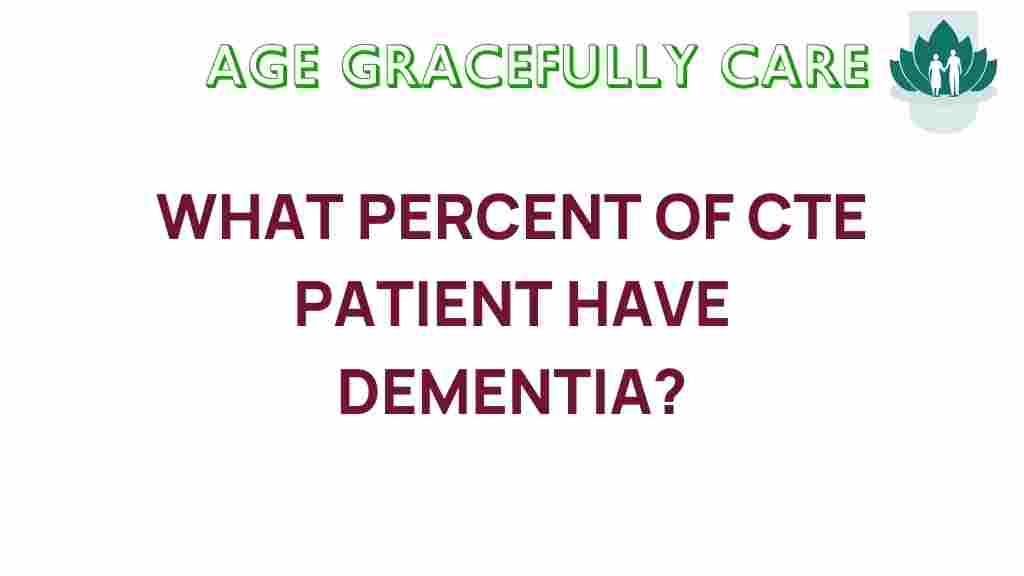Unveiling the Link: What Percentage of CTE Patients Develop Dementia?
Chronic Traumatic Encephalopathy (CTE) is a progressive neurodegenerative disease that has gained significant attention, particularly in the context of sports injuries. As awareness grows, so does the concern surrounding its potential link to dementia and other cognitive decline issues. This article aims to unveil the connection between CTE and dementia, exploring the statistics, research findings, and the broader implications for brain health and mental health.
Understanding CTE and Its Connection to Dementia
CTE is characterized by the accumulation of tau protein in the brain, often resulting from repeated head injuries, such as concussions. This condition is most commonly seen in athletes, particularly those involved in contact sports like football, boxing, and hockey. The symptoms of CTE can include:
- Memory loss
- Confusion
- Impaired judgment
- Depression
- Progressive dementia
Research has indicated that individuals with CTE may be at a higher risk of developing dementia, a broad term that encompasses various neurodegenerative diseases affecting memory, thinking, and social abilities. But just how prevalent is this link? Let’s delve into the statistics.
Statistics on CTE and Dementia
Recent studies have provided alarming statistics regarding the percentage of CTE patients who develop dementia. While the exact figures can vary based on the population studied and research methodologies, a significant number of CTE cases reveal a concerning trend:
- According to a study published in the journal JAMA Neurology, approximately 50% of former NFL players exhibited signs of CTE.
- Among those diagnosed with CTE, studies have indicated that up to 90% may eventually develop a form of dementia.
- The risk of dementia in CTE patients is notably higher compared to the general population.
These statistics underscore the urgent need for continued research into the relationship between CTE and dementia, particularly as awareness of brain health and the long-term consequences of sports injuries rises.
The Importance of Brain Health
Maintaining optimal brain health is crucial for reducing the risk of neurodegenerative diseases, including dementia. Factors influencing brain health include:
- Physical Activity: Regular exercise has been shown to improve cognitive function and reduce the risk of cognitive decline.
- Nutrition: A balanced diet rich in antioxidants, omega-3 fatty acids, and vitamins can support brain health.
- Mental Engagement: Activities that stimulate the brain, such as puzzles, reading, or learning new skills, can help maintain cognitive function.
- Social Connections: Strong social ties and engagement can protect against cognitive decline.
Understanding these factors can empower individuals to take proactive steps towards safeguarding their brain health.
Research Trends in CTE and Dementia
Ongoing research into CTE and its potential to lead to dementia is critical for developing effective prevention and intervention strategies. Here are some key areas of focus:
- Longitudinal Studies: Researchers are conducting long-term studies to track the progression of CTE in athletes and non-athletes alike, aiming to establish clearer connections between CTE and various forms of dementia.
- Biomarkers: Identifying biomarkers associated with CTE may facilitate early diagnosis and intervention, potentially slowing cognitive decline.
- Public Awareness Campaigns: Increasing awareness about the risks of head injuries in sports is crucial to prevent CTE and associated cognitive decline.
Such research not only contributes to academic understanding but also informs policy changes in sports safety and health guidelines.
Troubleshooting Tips for Concerned Individuals
If you or a loved one has experienced head injuries and is concerned about the risk of CTE and dementia, consider the following steps:
- Consult a Healthcare Professional: Discuss any symptoms or concerns with a doctor who specializes in brain health.
- Screening: Explore options for cognitive assessments or brain imaging, which can help identify potential issues early on.
- Implement Protective Measures: If involved in contact sports, prioritize safety by using appropriate protective gear and following concussion protocols.
- Engage in Brain-Healthy Activities: Incorporate physical, mental, and social activities that promote brain health into your daily routine.
Taking proactive steps can significantly impact long-term brain health and potentially mitigate the risks associated with CTE.
Conclusion: The Path Forward
The link between CTE and dementia highlights a growing public health concern that necessitates further exploration and awareness. With research indicating that a significant percentage of CTE patients may develop dementia, it is essential for athletes, coaches, and sports organizations to prioritize brain health through education and preventative measures.
As we continue to unveil the connections between sports injuries, CTE, and cognitive decline, it is vital to foster an environment where mental health is prioritized and where individuals are empowered to take control of their brain health.
For more information on how to protect your brain health, visit the Alzheimer’s Association for resources and guidance.
By understanding CTE, dementia, and their implications for brain health, we can work together to create safer sports environments and promote healthier lifestyles, ultimately reducing the risks associated with neurodegenerative diseases.
This article is in the category Health and created by AgeGracefullyCare Team
